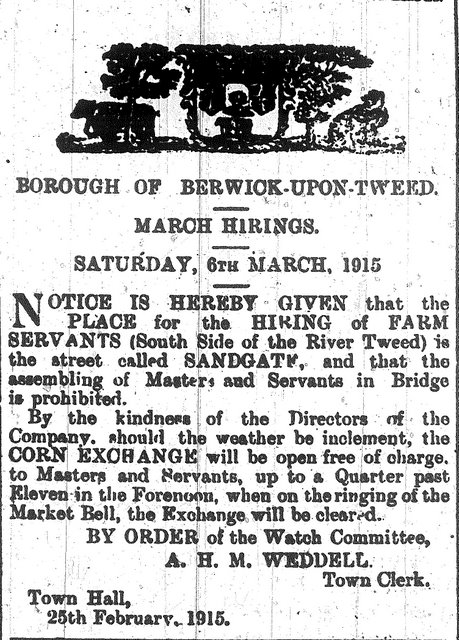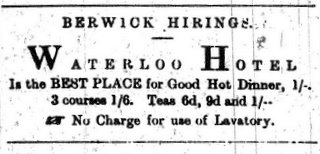SALMON PLENTIFUL
With a continuance of the remarkably fine weather conditions, the good catches of salmon on Tweed fishings have been well maintained during the ten days that have elapsed since the operations were commenced for the season, making the 1921 opening the most favourable in recent years. Whether this luck continues throughout the season is yet to be determined, but it is certain that the fish are in the river in a greater abundance than they have been for years. The catches have been pretty equally distributed over the fisheries, an equally good return coming from the higher reaches as from the fisheries at the river-mouth. Even Crab Water, where fishing is as a rule poor at this time of year, has had good catches, landing over thirty salmon in one day. The fish are all young salmon, not large in size, but of excellent quality and appearance. Trout are not quite so plentiful. The price quoted for salmon this week is 2s 5d per lb, having fallen during the week from 3s on the opening days. No prices are quoted for trout.

During the past quarter of a century there have been few such auspicious openings. In 1895 the weather conditions were not favourable, as the Tweed between Chain Bridge and Carham for about 16 miles was frozen over, making fishing impossible in the upper reaches, though the fishermen endeavoured to break up the ice with hammers. When, however, the ice broke up and the river-mouth was cleared, the catches were good, and the price was 1s 6d per pound – as low a figure as had been reached for many years. For the next ten years the openings were generally poor, and although the weather conditions were open, the catches were scanty. In 1905, in a spell of fine open weather, there was a very good opening, and with a good load of fish in the river, as many as 100 salmon were landed in one area at the opening tide. Although prices had averaged from 2s to 2s 2d per lb for the previous ten years, this run of luck reduced the prices to 1s 11d.
With an improving foreign market, the demand for fish is keen, though supplies asked for from the Continent are not so great as in pre-war days, when a large export trade was done from Tweed with Paris and Boulogne.
HINTS FOR THE HOME
Piano keys which have turned yellow can be whitened by the following method. Rub the keys with lemon juice, and while still damp polish with a cloth dipped in whiting or prepared chalk. Don’t let this get between the keys.
If a fire is needed in the bedroom, the time taken in lighting if often sufficient to do away with the good it gives. Gas fumes are bad for a sleeping person, but an electric radiator can be switched on in a second and turned off directly the need for it has disappeared.
Brass lids of fruit bottles often get stuck. Drop a little salad oil between the bottle and the lid with the aid of a feather, and then place the bottle about 18 inches from the fire. After the heat has caused the oil to run round the edge of the lid, a slight tap will release the lid.
Custard will curdle if you cook it too long or at too high temperature. A boiled custard should be cooked until it coats at the back of the spoon, and the water should not boil but be kept hot. A baked custard is tried with a knife, and if the knife comes out clean the custard is cooked, even if it is not brown.
MARCH HIRING
Belford
There was quite a good attendance at the annual hiring market for farm servants at Belford on Wednesday, and with good weather prevailing, those present spent a more pleasant day than has been the rule in recent years, when rough weather often made the day a miserable one. Few engagements were made, most of those present either having already engaged at present rates or hanging off until later markets. In spite of the difference of opinion of farmers as to whether women workers should be paid by hour or the week, the latter arrangement not being considered satisfactory, the demand for women workers was in excess of the supply. Only a few engagements were made, however, at the present weekly rate.
Wooler
There was a much larger gathering at Wooler Hiring Market on Thursday than for some years past, so large indeed that the supply seemed greater than the demand. Business was very slow, and in general nothing more than the minimum wage for men and women was asked for or offered. The majority of the agreements entered into with women were for 30s a week, the old custom of the daily wage being adhered to. There was a large attendance of farmers from Glendale and district. The difficulty of fixing up was not so much a question of wages as of adequate housing accommodation, many large families of workers not getting a chance. Representatives of the Workers’ Union were busy among the crowd in High Street in front of the Black Bull, and a meeting of workers was held in the Archbold Hall in the afternoon.

The weather was dull and cold, with a blustery wind that made standing about disagreeable. The larger part of the workers from the district arrived in Wooler with the early train, but many in the immediate neighbourhood cycled into the town during the forenoon. By midday the crowd had thinned considerably. No shows or roundabouts this year, only a few stalls near the Market Cross, and one or two “cheapjacks” endeavouring to dispose of their wares to the attentive but irresponsive crowd.






